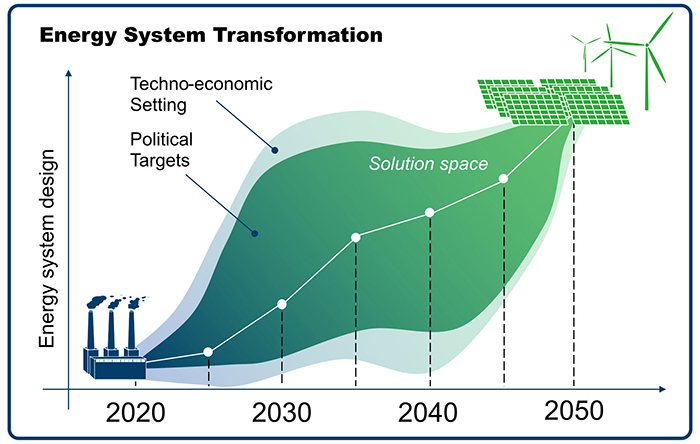

Conducting research for a changing society: This is what drives us at Forschungszentrum Jülich. As a member of the Helmholtz Association, we aim to tackle the grand societal challenges of our time and conduct research into the possibilities of a digitized society, a climate-friendly energy system, and a resource-efficient economy. Work together with around 7,400 employees in one of Europe’s biggest research centers and help us to shape change!
Achieving a secure, greenhouse gas-neutral energy supply is one of the greatest challenges of the 21st century. At the Institute for Energy and Climate Research – Jülich Systems Analysis (IEK-3), we conduct research into how a sustainable energy system can be achieved and what it might look like. To this end, we develop a wide range of highly complex and detailed energy system models that we utilize to assess local-to-global energy systems in an integrated manner. Thereby, we aim to provide the best possible knowledge-based support for the implementation of the clean energy transition.
We are offering an exciting
PhD Position – Innovative Pathways for Grid Resilience: Flexibility and Volatility Analysis in Electrical Distribution Grids
Your Job:
In order to address the challenges associated with climate change, it is necessary to understand and design future distribution networks as we transition to sustainable energy sources. Moreover, the flexibility of decentralized energy sources, coupled with the increasing emphasis on incorporating self-sufficiency in buildings and energy-intensive technologies, has significant implications on distribution grids. Moreover, these changes would impact the reliability of the distribution grids and introduce challenges in resolving issues associated with the volatility of grid development and reinforcement. Thus, the objective of this doctoral thesis is to analyze the adaptability and instability in strengthening distribution grids by using geo-referenced synthetic distribution grids. Here, you will analyze the performance of distribution grids in different scenarios and configurations towards achieving greenhouse gas neutrality. To achieve this, you will perform the following tasks:
- Conducting comprehensive study on the flexibility of electrical distribution grids, evaluating various scenarios and their impacts
- Designing and further developing the geo-referenced synthetic distribution grids generation tool
- Designing and implementing different model configurations to simulate various grid configurations and assess their performance
- Investigating and applying optimization methods to improve grid resilience and flexibility
- Applying advanced data analysis techniques to analyze simulation findings and draw significant insights
- Determining cost-effective methods for grid reinforcement through performance evaluations
- Presenting research findings at conferences, publishing articles in high-impact journals, and actively contributing to the wider scientific community
Your Profile:
- Master’s degree in the field of Electrical Engineering, Energy Systems, or a related field of study
- Interest in energy systems analysis, integration of renewable energy sources, and grid resilience
- Good knowledge in electrical networks analysis and simulations
- Good knowledge in mathematical optimization methods
- Experience in data analysis and programing (preferably Python)
- Ability to work independently and collaboratively in a research environment
- Fluent English language skills, both written and spoken; German language skills are advantageous
Our Offer:
We work on the very latest issues that impact our society and are offering you the chance to actively help in shaping the change! We offer ideal conditions for you to complete your doctoral degree:
- A highly motivated working group as well as an international and interdisciplinary working environment in one of the largest research institutions in Europe
- Active further development of a comprehensive energy system model in order to support energy policy decision-makers in a scientifically sound manner
- Excellent scientific and technical infrastructure
- Opportunity to participate in (international) conferences
- The opportunity to complete a doctoral thesis within three years through professional supervision and internal support services; time taken to submit the final thesis for the last 16 doctoral students at IEK-3: 2.7–3.4 years
- Further development of your personal strengths, e.g. through an extensive range of training courses; a structured program of continuing education and networking opportunities specifically for doctoral researchers via JuDocS, the Jülich Center for Doctoral Researchers and Supervisors: https://www.fz-juelich.de/en/judocs
- Excellent conditions for remote (moving to the Aachen-Düsseldorf-Cologne region is not absolutely necessary)
- Flexible working hours, 30 days of annual leave and provision for days off between public holidays and weekends (e.g. between Christmas and New Year)
In addition to exciting tasks and a collaborative working atmosphere at Jülich, we have a lot more to offer: https://go.fzj.de/benefits.
The position is for a fixed term of three years. Pay is in line with 75% of pay group 13 of the Collective Agreement for the Public Service (TVöD-Bund) and additionally 60% of a monthly salary as special payment (“Christmas bonus”). Further information on doctoral degrees at Forschungszentrum Jülich including our other locations is available at https://www.fz-juelich.de/gp/Careers_Docs.
WE WERE AWARDED
